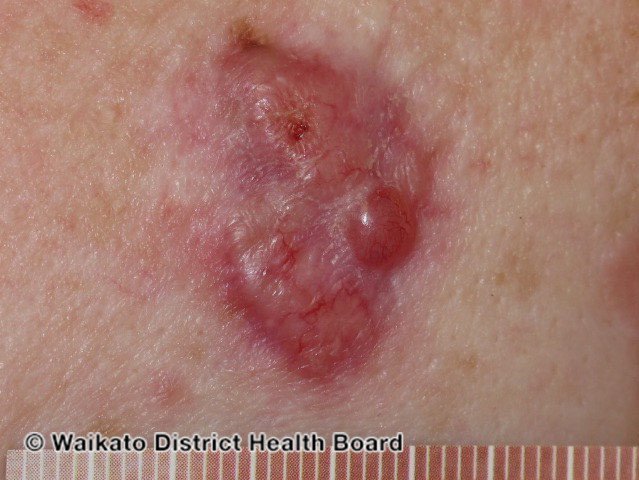
Basal Cell Carcinoma: Symptoms & Treatments
An example of basal cell carcinoma, which looks like a shiny, pink bump or blemish on sun-damaged areas.
Credit: DermNet NZ
What is basal cell carcinoma?
Basal cell carcinoma (BCC) is the most prevalent type of skin cancer. It arises when mutations occur in the basal cells of the skin, which are responsible for producing new skin cells. BCC predominantly affects individuals with fair skin and those who have had substantial sun exposure. Although it is infrequently fatal, untreated BCC can spread across the skin, leading to disfigurement. Prompt treatment is essential.
What causes basal cell carcinoma?
BCC develops when mutations accumulate in the basal cells of the epidermis. The primary culprit behind these mutations is UV radiation from the sun or tanning beds. Additionally, individuals with a family history of BCC or those on immunosuppressive medications are at an elevated risk. Over time, accumulated mutations can lead to uncontrolled cellular proliferation, resulting in tumor formation. The risk of BCC increases with age, and it is most common in individuals over the age of 50.
What are the symptoms of basal cell carcinoma?
The appearance of BCC can vary, with symptoms including:
A smooth, waxy bump that may be pink, white, or flesh-colored
A lesion that bleeds easily
A scar-like lesion that's brown in color
A flat, crusted lesion
A firm, red or pink growth
How do I treat basal cell carcinoma?
Treatment strategies for BCC depend on factors such as location, depth, and size of the carcinoma. Typically, surgical excision under local anesthesia in a clinical setting is the primary approach. Other treatment options include:
Mohs Micrographic Surgery: This technique involves sequential removal of skin layers, particularly in high-risk or cosmetically sensitive areas.
Superficial Radiation Therapy (SRT): SRT is a non-surgical, painless treatment that uses low-dose radiation to target cancer cells at the skin's surface while minimizing exposure to healthy surrounding tissue.
Oral Medications: Such as vismodegib (Erivedge), which might be considered for difficult-to-excise areas or when multiple lesions are present.
Topical Medications: Imiquimod or 5-fluorouracil (5-FU) are used primarily for superficial lesions.
Electrodesiccation and Curettage: This method involves scraping away the lesion and using an electric needle to treat the area.
Cryotherapy: Freezing is generally reserved for smaller or superficial lesions.
How do I prevent basal cell carcinoma?
The majority of BCC cases can be prevented by minimizing exposure to sunlight and avoiding tanning beds. Using sunscreens with an SPF of 30 or higher, wearing hats, and using protective clothing are crucial preventive measures. Regularly monitoring the skin for new or evolving lesions ensures early detection and timely treatment.
Early detection and treatment of basal cell carcinoma are crucial for optimal outcomes. Regular skin examinations with your dermatologist and being aware of any new or changing lesions can aid in maintaining healthy skin.
Superficial basal cell carcinoma can resemble eczema or psoriasis.
Credit: DermNet NZ
Basal cell carcinoma that is pigmented can resemble melanoma.
Credit: DermNet NZ



